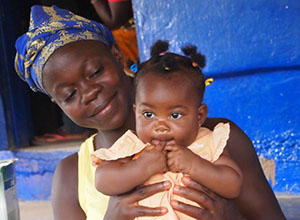
Some two billion people around the world consume a diet lacking the nutrients needed to live healthy and productive lives. The world community is reacting with increasing urgency, focusing especially on addressing global undernutrition among pregnant women and children under two years of age.
Peace Corps identified nutrition as a key focus area of its interventions under Feed the Future, the United States government’s global hunger and food security initiative. In 2011, Peace Corps and the United States Agency for International Development (USAID) signed the Global Food Security Agreement and established the USAID/Peace Corps West Africa Food Security Partnership (WAFSP) to provide improved food security training to Peace Corps Volunteers (PCVs) worldwide.
In 2013 SPRING assisted Peace Corps and WAFSP with introducing and rolling out the Essential Nutrition Actions package in five West African countries (Benin, Gambia, Guinea, Senegal, and Sierra Leone) by facilitating a training of trainers (TOT) for Peace Corps staff and developing action plans in the five countries; facilitating three trainings jointly with three Peace Corps offices in Benin, Guinea, and Gambia; and drafting, testing, and finalizing Peace Corps training materials to be used by Peace Corps staff and volunteers.
The training aims to empower Peace Corps Staff, Peace Corps Volunteers (PCVs), and Community Volunteers (CVs) with knowledge and proven-effective messages on women’s nutrition, infant and young child feeding (IYCF) practices, the importance of micronutrients and hygiene practices, and the basics of homestead food production (HFP).
The complete training package consists of a reference handbook, an orientation guide, a training guide for all PCVs, and a training guide for Peace Corps health volunteers.
About this Document Package
Its purpose is to equip PCVs and their counterparts with basic inter-personal communication skills to support their communities in adopting improved practices on women’s nutrition, IYCF, micronutrients, hygiene, and HFP.
It is indented for a three-day pre-service or in-service training for PCVs who will initiate activities related to nutrition, hygiene, or HFP in collaboration with their counterparts, to assist volunteers in identifying community contacts and interventions to improve the adoption of high-impact nutrition interventions. It should be provided along with the reference handbook.
Training Methodology
The training takes a participatory approach, reflecting the widely acknowledged theory that adults learn best by practicing and reflecting on their experiences. The goal was to keep training sessions relevant to participant needs.
The course encourages participants to acquire skills in a hands-on way. It also uses varied training methods, including demonstrations, practice, discussions, case studies, group discussions, and role playing.